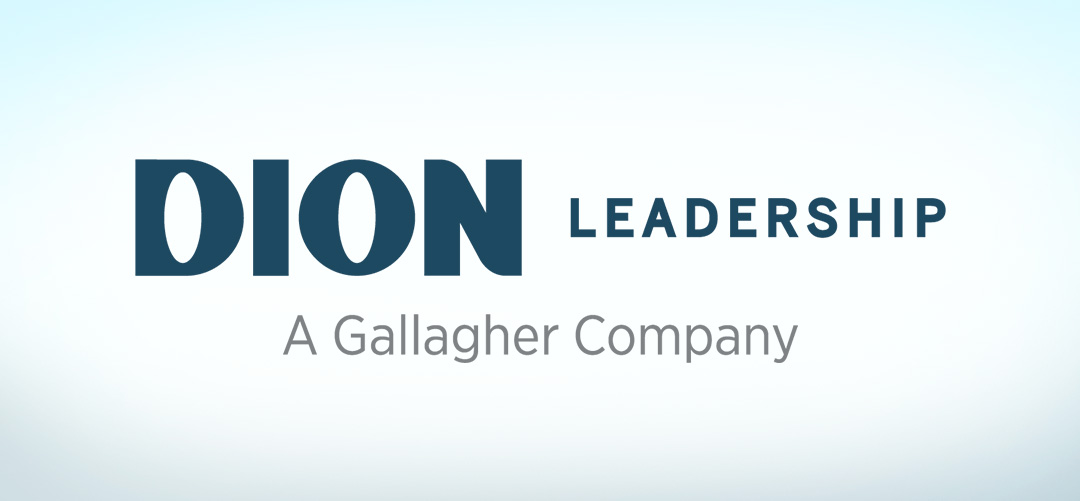On July 31, 2025, Dion Leadership was acquired by Gallagher. We are thrilled to be joining forces with this leading global consulting, risk management, and insurance brokerage firm. The Dion Leadership team will remain in place and will continue operating as usual, ensuring that we stay true to our mission of creating workplaces where employees start every day excited and end every day accomplished. The transition has been well-received, our team remains engaged, and the business is positioned to thrive in its next chapter.
The Backstory
It’s not uncommon for me to get a couple of emails or LinkedIn messages each month from firms offering to help me sell Dion Leadership or from private equity groups interested in acquiring businesses like mine. For years, I deleted those solicitations without a second thought. But last year, shortly after becoming a grandfather, I found myself paying more attention to them. After all, I’m not getting any younger—and I began to acknowledge that at some point, I needed to start building an off-ramp to retirement. Ideally, one that would ensure the continued growth of the business I’ve worked so hard to build, and one that would protect the talented team we’ve assembled.
Selling a company is one of the most complex and consequential decisions a business owner will ever make. For many founders and executives, it’s not just a financial transaction—it’s the culmination of years (or decades) of vision, hard work, and deeply held purpose. And as I’ve recently come to realize, it’s also filled with moments that test your leadership in new and profound ways.
High Stakes, Culture Missteps
Most acquisitions fail to live up to expectations. In fact, studies consistently show that between 70% and 90% of mergers and acquisitions fall short of delivering their intended value (Harvard Business Review). While there are many reasons for this, poor cultural integration is one of the most commonly cited culprits (McKinsey & Company). According to survey data collected by PwC, cultural differences between the acquirer and the target company are among the major reasons why many mergers and acquisitions fail.
How can leaders navigate an acquisition or merger in a way that keeps culture front and center? Selling a business is a transition unlike any other, and over the last several months, I’ve gained firsthand experience in how important it is to focus on something that often gets overlooked during due diligence: shared values and culture alignment.
Know Yourself—and Your Value Proposition
Before you can determine whether a buyer is the right fit, you need to be crystal clear about who you are as a company. That includes:
- Your mission and purpose: Why does your organization exist beyond making money?
- Your core values: What do you stand for, and how do you behave as a company?
- Your unique value proposition: What do you do exceptionally well that differentiates you in the market?
Too often, buyers and sellers focus on matching up financials, client lists, or intellectual property—and certainly those are important. But buyers aren’t just acquiring assets; they’re inheriting a culture, a brand, and a legacy. If you can’t articulate what makes your company distinct and valuable beyond the balance sheet, it’s hard to find a buyer who will honor that legacy moving forward.
Culture Fit Isn’t a Nice-to-Have—It’s a Deal Maker (or Breaker)
When it comes to mergers and acquisitions, culture is often labeled as “soft stuff”—yet it’s one of the most common reasons integrations fail. Misalignment in values, leadership styles, or ways of working can erode employee trust, confuse customers, and damage reputations.
Now, from firsthand knowledge, I can affirm that during a sale, leaders should be evaluating prospective buyers as much as the buyers are evaluating the company. Ask yourself:
- Does this buyer share our values?
- Do they understand and respect our leadership philosophy?
- Will they support our people and build on what we’ve created—or dismantle it in the name of “efficiency”?
When I began to seriously consider offers from potential buyers of Dion Leadership, I approached the process with the same values-driven mindset our team brings to our client work. I didn’t just evaluate terms and financials; I paid equal attention to cultural alignment. I knew that the future of our people, our clients, and our impact would hinge on more than just a smooth transaction. It would depend on partnering with an organization that shared our purpose and leadership philosophy. That clarity guided my decision-making as I weighed the true value of multiple offers.
The Buyer’s Role: Clarity and Respect
The acquiring company has a leadership responsibility, too. They need to be clear about why they’re buying you, what they hope to preserve, and how they plan to integrate the new organization. The best acquisitions happen when the buyer is curious, humble, and open to learning from the seller—not just absorbing them.
When both parties bring mutual respect, transparent communication, and a shared commitment to long-term success, the sale becomes more than a transaction. It becomes a true partnership with an aligned culture and goals.
The Rest of the Story
Gallagher is an ideal fit for Dion Leadership. With nearly 600 acquisitions under its belt, Gallagher brings a wealth of experience in integrating new organizations thoughtfully and effectively. The company understands that culture is not something to be ignored or overlooked—it’s a key success factor to be respected, nurtured, and amplified. This belief comes to life in the 25 tenets of The Gallagher Way, a shared set of values that make up the foundation of the company culture. Rather than absorbing firms into a one-size-fits-all model, Gallagher works to preserve what makes each acquisition special, encouraging organizations to continue doing what they do best while benefiting from broader support and resources.
We’re equally aligned in our commitment to long-term client relationships. Just as Dion Leadership has built enduring partnerships by delivering high-impact leadership development solutions, Gallagher is known for its deep client loyalty and trusted advisory services. Together, our complementary offerings expand the value we can bring to organizations navigating today’s leadership and workforce challenges. Dion Leadership adds a unique and proven set of talent development capabilities to the Gallagher portfolio—and we’re excited to see what we can accomplish together.
Selling your company is not an exit from leadership—it’s an extension of it. Your employees will be watching how you handle the transition. Your clients will be looking for signals of stability. And your buyer will be looking to you to help carry the culture forward.
Take the time to reflect on what matters most to you and your company—and don’t compromise on those values. The numbers matter, but the fit matters more. Because long after the deal closes, the people and the purpose are what endure.
Read Next
Happiness at Work
I am not a big New Year’s resolution person. I believe in the notion of using each day...
Tomorrow’s Workplace Starts Here
Our 2026 catalog is out and ready for you to download! The theme that our team chose...



